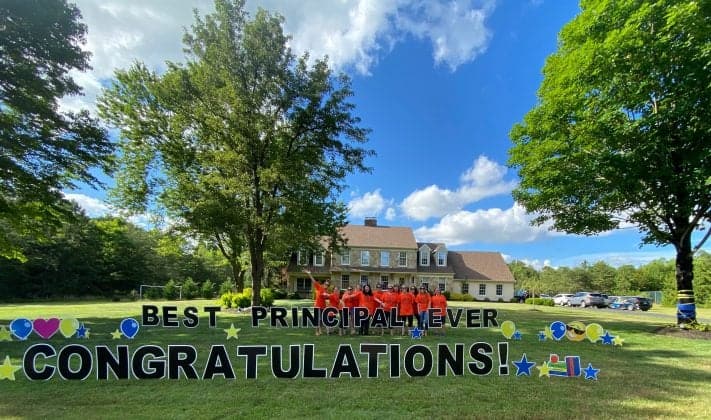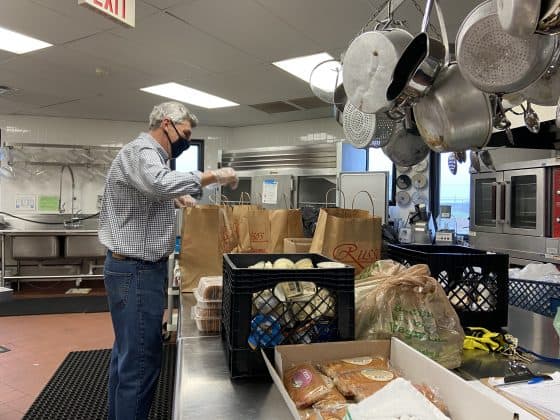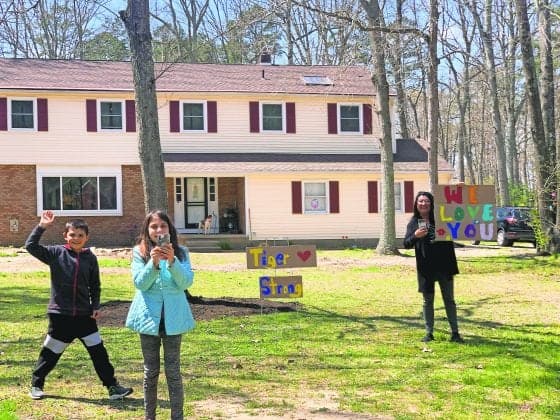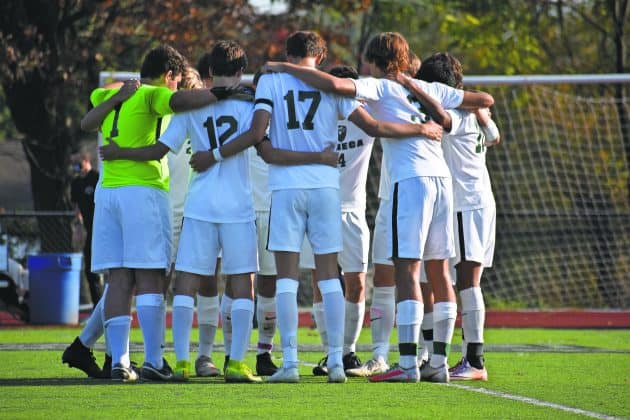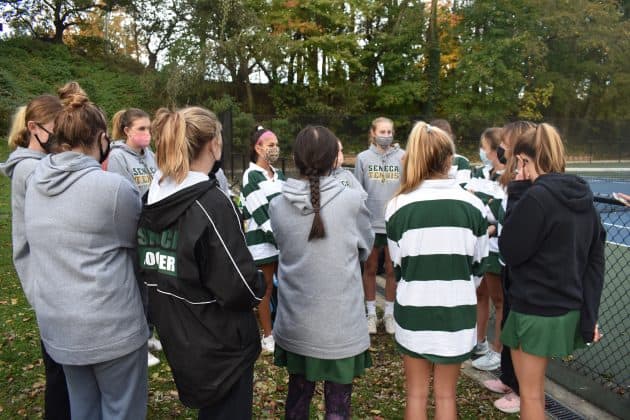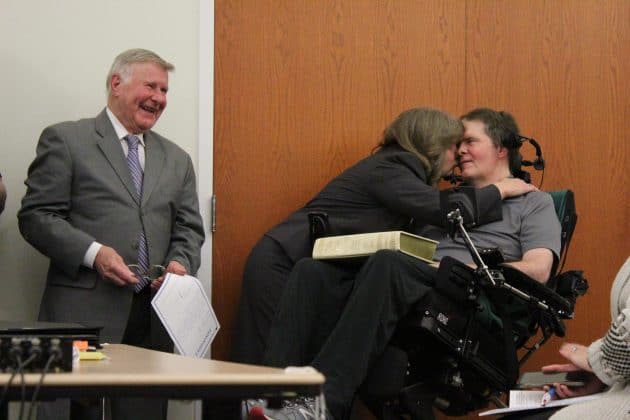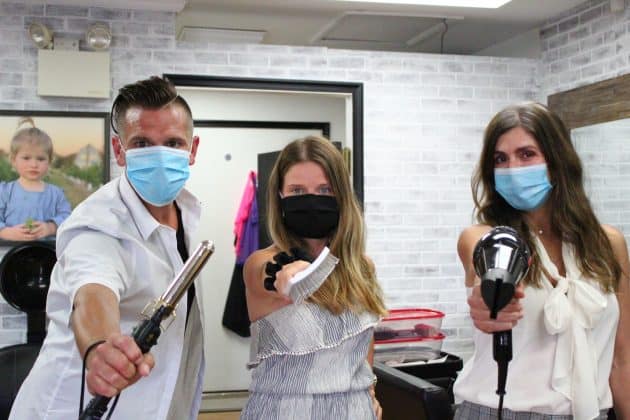In 2020, a year that posed challenges for everyone in the world, Tabernacle’s residents shone.
Neighbors rose to the occasion to support each other as the township battled closures, health emergencies and financial struggles during COVID-19. Seneca’s athletes leaned on their teams to win championships and new leaders on town council and Tabernacle School District found their way during a difficult-to-navigate time.
Here’s a look at some of 2020’s top stories:
COVID-19
In mid-March, the world shut down to protect people from the pandemic. In Tabernacle, hospitals, libraries, schools and more limited in-person use.
The pandemic forced health systems like Jefferson Health and Virtua Health to forbid visitors in the main hospitals and units, with exceptions. Jefferson Health started curtailing its elective surgeries on March 13.
“Virtua’s request to the public is that they look for ways to help ease the burden of the health care workers in their lives,” noted Dr. John Matsinger, chief operating officer at Virtua Health. “This could be volunteering to provide child care, preparing meals, or simply sending a message of appreciation for the sacrifices they make every day.”
The early days of the pandemic created inventory shortages for most supermarkets and general stores. Panic buying made essentials like toilet paper, disinfectants and hand sanitizer nearly impossible to purchase.
Murphy’s Markets couldn’t stock those items fast enough, running into shortages from suppliers focused more on stocking hospitals, governments and other essential organizations.
“We have to pull together in times of need,” said Edward Tamburo Jr., a ShopRite of Medford customer. “I don’t care about your political views, religion — if you need toilet paper, I will give it to you. We’ve got to come together.”
Greg Melville took that sentiment to heart, creating PPE (Personal Protective Equipment) for essential workers by using his 3D printing skills.
He began with the Tabernacle Rescue Squad on April 15, then fulfilled requests from fire departments in Medford and Tabernacle and emergency medical services in Shamong and Collingswood. The Children’s Hospital of Philadelphia and Voorhees and Penn Medicine’s COVID-19 unit all received donations from Melville, thanks to the support he received from GoFundMe campaign donations.
Melville’s basement was transformed into an assembly line of equipment, requests and boxes ready to be dropped off. Creating equipment for those who need it most is something Melville declined to receive kudos for, instead shedding light on people who volunteer their lives to treat COVID patients. He described their bravery as mind-blowing.
“I’m not putting myself in danger, I’m not spending thousands of dollars doing this,” Melville noted. “I’m the middle man of all of this. It (GofundMe campaign) has been covering the costs of this and I can’t imagine someone else doing this, and I have been doing regular day things. I’m not doing anything crazy special.
“I’m just lucky I have the skills.”
Schools
Before Tabernacle’s schools closed on March 16, the township’s students were flying high.
Tabernacle’s fourth graders raised the bar for creativity in March, presenting practical inventions at the South Jersey Regional Science, Technology, Engineering and Math (STEM) Tank competition.
Tabernacle Elementary students created technology that would alert drivers of deer, calm babies and bring laundry to the washer, among other uses. All of the inventions were created in the school’s Collaboratory, a space for STEM projects and lessons. Collaboratory teacher Brittany Murro explained that young inventors hit roadblocks searching for ideas not already created or patented.
“There are so many things out there, and we had to create something that hasn’t been designed yet, or make a noticeable improvement to something that doesn’t exist,” she added.
Murro and Assistant Principal Shaun Banin commended the students for their in-school performances. “They persevered, worked really hard, put the time in and they did it themselves,” Murro shared. “I think we have some entrepreneurs on our hands.”
In February, Seneca’s High School’s marching band won recognition from the Lenape Regional High School District’s Board of Education for its 2019 state champion title.
“Thank you guys for supporting the arts and music in this district,” Band Director Keith Styers told the board. “I can’t say to you how much that means to me as a father, educator and a taxpayer in this district.”
More than 20 band students were personally recognized when Styers announced their names and handed them certificates of achievement, Lenape Pride letters and varsity letters and pins.
Seneca’s win landed it in the same level as sister schools Lenape, Cherokee and Shawnee.
Styers said the “Seneca Family” has supported his department and the band members throughout the season.
Once COVID hit, after learning that their own community experienced a food shortage, educators banded together to give back to the Seneca Family. A request for help from school co-workers was followed by a flood of donated food, toiletries and grocery store gift cards for students and low-income families in the area.
“So many staff wanted to help, and we realized quickly the need was going to be big in the community, and it was only to grow as things got worse,” said Assistant Principal Karen O’Neil. “More people are going to be out of work, and so we started to organize.”
The bags of food contained at least three days of meals for breakfast, lunch and dinner; a starch; granola bars; vegetables; and a $50 gift card. Bill Fisher, a health and physical education teacher, started a fundraiser for the food drive selling homemade Seneca masks.
“Knowing that you’re loved by your school and community has also brought a lot of people together,” guidance counselor Erica Maira mentioned.
Seneca’s 2020 graduates celebrated at a socially distanced ceremony in July. Speakers described graduates as a resilient group, remembering and honoring the spirit Joey Bakos (who passed away in September) brought to the school. He was posthumously presented with a high school diploma.
Salutatorian Evelyn Locke described her Seneca education as rewarding and reiterated the school’s family mantra.
“I hoped that my class would remember all of the great aspects of Seneca, and how special our bond is with the teachers and staff, rather than focusing on what we missed out on as seniors,” she shared.
Locke’s last words to fellow graduates?
“‘Our Seneca family will always be with us,’” her speech read. “‘No matter what we missed out on over these last months, that spirit, that support and laughter, that striving — that is Seneca Family.”
Seneca High School not only sent its well wishes to the class of 2020 on July 16, but offered a round of goodbyes to an administrator who fostered connections with the community. Long-time Principal Jeff Spector entered retirement on Aug. 1, having developed a bond with the Seneca family through interactions with students, co-workers and beyond.
Spector became emotional at graduation as he recalled the graduates and other young students he encountered. A principal for 12 years and assistant principal for five, Spector noted the school community continually raised the “greatest group of young people” year after year.
“They buy into what we do and they’re a community that gives and believes in community service,” he maintained. “That has stayed consistent, and it has been a joy and pleasure to serve this community for 17 years.”
Tabernacle School District principal of more than three decades, Susan Grosser, also retired this year. The end of the school year for Grosser was celebrated June 18, as students and co-workers drove by her daughter Emily’s home to give the veteran a warm send-off to retirement.
The tributes brought tears to her eyes.
“I felt good because the people here today, they’ve been great supporters and they do a great job,” Grosser said. “The one thing I feel bad about is not seeing the kids,” she added of the truncated school year caused by COVID. “That was tough and what hit me the hardest.”
Grosser’s position opened a spot for a new leader: Melissa Gallagher, who became Tabernacle’s assistant principal in July. She calls the move the culmination of her career, one spent partly as a teacher and specialist in the Pinelands Regional School District.
“It’s nice to see students seeing growth and seeing them start to care and be their person,” Gallagher remarked. “I’ve been an advocate for them.”
Government
A change in leadership brought new opportunities to the township as a whole.
The Sun profiled Col. Stephen Henske, Air National Guard commander and school board member. Initially wary after former school Superintendent Glenn Robbins asked him to join during a tough time for the district, Henske got a call from fellow soldier and former board member Antony Laudicina that changed his mind. He later founded the Tabernacle Education Foundation with Judy Sailor, Jen Houghstead and Fran Gallo to financially support education initiatives in the district.
A 26-year career in the military taught Henske the need for something he cherishes and promotes: diversity. Not just in the areas he serves and the people he meets, but within the guard and his unit. He has learned of the differing viewpoints they hold and what they believe is the best course of action.
“Diversity isn’t a bad thing; it’s what I think is good about us,” Henske noted. “It makes us strong and that’s what I try to talk to students about when I tell them about the military. You’re going to meet other people and you need to understand and accept that not everyone is like you.”
In February, Nancy McGinnis stepped into the role of committeewoman. She eyed economic development, sharing a document with the committee highlighting ideas that included adding a sewer line on Route 206 to bring more businesses to the corridor, creating an electronic bulletin to better inform residents and pressuring the state to amend its constitution regarding publications of legal notices.
“When I ran to be on the township committee, that was the platform I ran on: Bring in more ratables to the township and we wanted to keep Tabernacle unique and rural,” McGinnis shared.
Sports
The township’s young athletes soared as Golden Eagles to championships this year.
Two years was all it took for bowler Delaney Insinga to join a sport and become a conference champion, a feat she hopes to carry into next season. In February, the sophomore bowled her way to becoming the 2019-2020 Olympic Conference Champion with the rest of her Seneca High School team.
Insinga is Seneca’s first girl to advance to the states. Her team had an overall record of 14-2 in the regular season. Individually, Insinga bowled a 500 series, placing 15th during the qualifiers to make it to state.
“It was a good environment that day because we were happy and excited and we knew what we had to do, and we tried our best,” Insinga said. Her aspirations for the state championship were cut short by the pandemic, but she still sees the season as a lesson.
“It feels really good, considering when I first started on how to bowl, my coach really helped me become a better bowler,” Insinga shared.
Seneca’s senior field hockey players celebrated a sectional title — the team’s fourth in four years. The senior quartet of Madeline Lawlor, Cassidy Strittmatter, Olivia Quagliero and Devon Webb — posing, kissing, and hamming it up with those four trophies afterward — entered a program that had never won a championship and are leaving it 4 for 4 in sectional title games.
“They were the ones that (made it happen). They learned from the ones ahead of them and it speaks volumes of the program, the coaches that have been through this program to start it,” Seneca coach Kristina Foster said. “I think for the seniors to be able to finish this year with yet another trophy, it means the world to them, it means the world to us and it’s going to set a precedent for the ones after them.”
It was quite a run for a school that only opened its doors in 2003, the year many in the 2020 senior class were born. The legacy the seniors left catapulted Seneca into the upper echelon of South Jersey field hockey, joining the likes of perennial powers like Haddonfield, Shawnee, Moorestown and Eastern.
Tabernacle’s residents keep creating
Even a pandemic couldn’t keep Tabernacle residents from achieving high.
In October, The Sun highlighted Daniel D’Auria, known by day as a trained and established gastroenterologist who spends his off hours capturing photos of animals around the world.
Awards and national recognition resulted from the Tabernacle resident’s hobby, but none was a goal. He simply shared the beauty in nature and captivated curious minds with his photos of natural animal habitats.
Photos of his on Facebook, his website and a Flickr account are accompanied by a caption where he interprets the “philosophy of nature,” or whatever subject piques his interest as he gazes at the images. Some of his thoughts were compiled into a children’s book, notably on the subject of “Nani na Nene,” a goose kept in Hawaii’s national parks.
Each of D’Auria’s children’s books, published in coordination with National Wildlife magazine, are rhymed and teach young readers about animals and nature. Most profits from the books go to state park systems or the U.S. National Park Service.
New Jersey is also a subject. D’Auria often captures native birds seen around Tabernacle and finds animals large and small.
“You’re creating something that emulates what you see,” he explained of his passion. “I bring my photos home to my wife because I want her to see what I see. It teaches us to forgo certain things, like mining for gold, for better things, like the bears.”
Meghan Lepsis, a Seneca freshman, also found herself lost in nature as she wrote and published the book “Lost at Sea.” The Seneca High School freshman worked on the novel during seventh grade as part of a flash fiction contest by Stephen Kozan. Lepsis’ submission was a runner-up.
“(Kozan) told me to continue writing my book and a year later, I came back and handed him the first seven chapters of it,” Lepsis recalled. “He emailed me a week later offering to publish it. He hadn’t read all of it, but wanted to publish it.”
Her book tells the journey of two siblings, Matt and Amber, whose parents’ disappearance became a real-life nightmare. According to the author’s synopsis, the parents were lost in the ocean and the siblings join the Coast Guard and implore other officials to search for them.
Leaving much of the novel up to readers to find out, Lepsis did coyly share that the book features dreams to explain how Amber handles rough waters, literally and figuratively.
“I like the part toward the end where they all come together — you’ll see,” the young novelist said.

